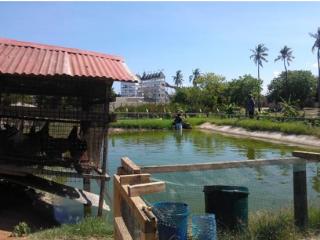This is the fourth case study from SUEUAA (Strengthening Urban Engagement in Universities in Asia and Africa), written by Mpoki Mwaikokesya and Heriel Moshi of the University of Dar es Salem. The project is interested in how Universities in the Global South can contribute to solving geographical, economic and social issues in their cities. The project is looking at six cities in six different countries: Harare (Zimbabwe), Dar-es-Salaam (Tanzania), Johannesburg (South Africa), Manilla (Philippines), Duhok (Iraq), and Sanandaj (Iran).
The SUEUAA project involves academics from each of these cities, who will be carrying out fieldwork, and elite interviews with decision makers in the city and senior academics from local Universities, to better understand the ability of Universities to respond to city issues. This blog post highlights the developments in aquaculture and agriculture in Dar-es-Salaam.
Tanzania regards agriculture as a pillar of the economy which accounts for almost half of the country’s gross domestic product. However the agricultural informal sector faces many challenges. In most cities, including Dar-es-Salaam, members of the community face such challenges as inadequate value addition in agricultural and fisheries products, inadequate adherence to standards, poor quality of agricultural fisheries products marketing, weak institutional set-up for dealing with agricultural and fisheries marketing and limited use of marketing risk management approaches.
The College of Agricultural Sciences and Fisheries Technology (CoAF) of the University of Dar-es-Salaam,was created to address some the challenges in the agricultural sector. It focuses in the areas pertaining post-harvest technologies, processing, value addition, biotechnology, nanotechnology and innovations in agro and aqua-technologies. The integrated Aquaculture and Agriculture pilot study which integrates fish, chicken and vegetables conducted at Kunduchi Dar es Salaam is one the efforts of University to contribute to solving major societal challenges.
As part of the project activities, a test site for validation of the IAA concept was developed at the University of Dar es Salaam, Kunduchi Campus. Results from test site indicated that such integration apart from enhancing fish and vegetable harvests, provides additional crops (e.g. chicken, eggs and vegetables) and thus increase household income and food security and nutritional status through consumption of these products.
During the year 2016, project implementers participated in various exhibitions by showcasing IAA results and models. These included the UDSM Research Week Exhibitions and the Mkulima[1] Market event conducted within the University. The exhibition also took place at Dar es Salaam International Trade Fair (commonly known as Saba Saba Exhibitions). In order to reach out to communities, the Department of Aquatic Sciences and Fisheries Technology (UDSM) conducts training workshops to extension officers and onsite demonstrations to extension officers from Dar s salaam, Coastal region and Tanga on challenges of marketing infrastructure, space water etc. Within the urban area fingerlings are produced and sold to fish farmers in several places.
Furthermore, the project provided practical education to fishery communities on sustainable fish capture methods as one of the efforts to overcome dynamite fishing. The project contributed significantly in raising awareness that fish particularly Tilapia can be reared in Dar es Salaam. Additionally, the number of fish farmers and the modern fish ponds in Dar es Salaam is now growing. A consultant firm has been established to offer training and consultations on aquaculture mainly on fishery.
More information on IAA can be found on their website: https://aquatic.udsm.ac.tz/iaa/preface.php.
We would like to acknowledge Professor Philip Bwathondi, one of the project implementers for sharing information with us regarding IAA.
[1] Swahili word for a farmer

